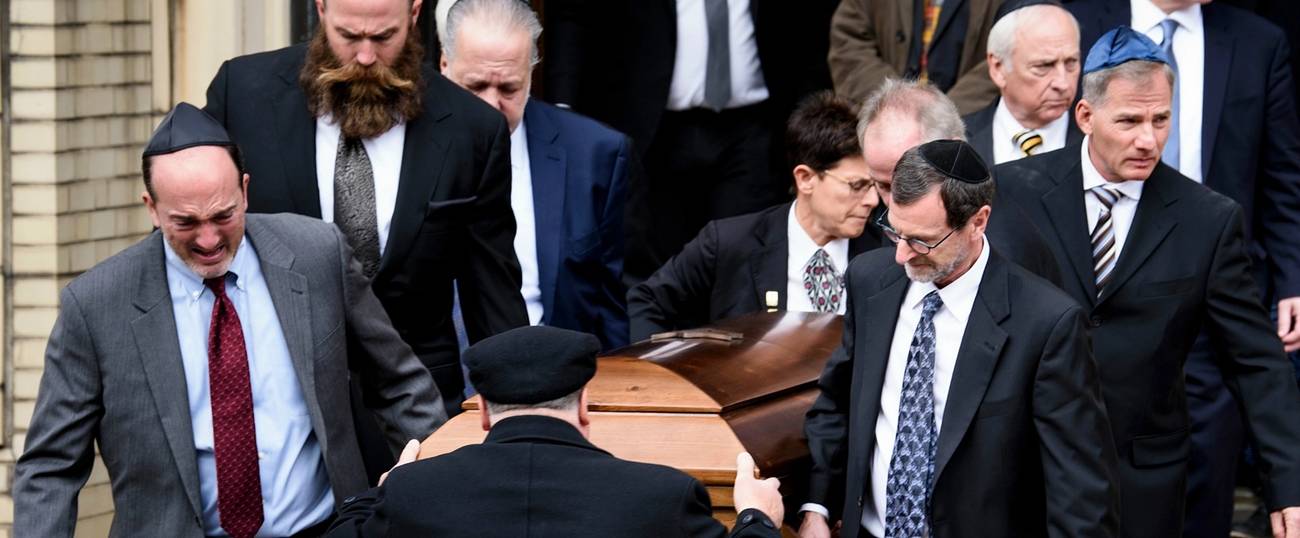Burying the Victims of the Pittsburgh Massacre
Through funerals and protests, stories and memories about the lives of the people killed rise through the chaos in Squirrel Hill




At around 5:10 p.m. on Tuesday, the presidential motorcade left the Tree of Life, after President Donald Trump and the First Lady placed rocks on top of a row of 11 wooden memorial markers. According to a local source, President Trump walked through the still blood-spattered synagogue interior. Members of the Pittsburgh Chevra Kadisha have been at work inside the Tree of Life, as has the FBI.
Twenty minutes after the president departed, marchers advanced through the streets of Squirrel Hill holding signs saying “Hater in Chief” and “We Do Bridges, Not Walls” and singing “Ozi V’Zmirat Yah.” By 6 p.m., hundreds more were gathered at the intersection in front of the JCC to attend a shiva minyan for one of the people murdered on Saturday.
The first funeral on Wednesday was at 10 a.m.; the next two began at 1 p.m. There are three more tomorrow, and one on Friday, which will be followed by the arrival of the first Shabbat since the massacre. After more than one of the funerals, mourners have crowded into the street behind the departing hearse, the result of a common impulse to extend a moment of shared grief until the latest possible moment, or to delay the moment everyone disperses. At the funeral of Joyce Fienberg, mourners circled around the hearse in the moments before it left and sang a low nigun.
Stories of the dead filter through the chaos: Melvin Wax, an 87-year-old member of the Or Chadash congregation, was born into poverty and became an accomplished corporate accountant. He spent nearly his entire life in Pittsburgh, aside from a three-year stint as an Army corporal deployed in Germany during the Korean War. He was first to shul every week, the leader of pesukei d’zimra on Shabbat mornings, and someone every congregation in Squirrel Hill could call if they needed to fill out a minyan.
When 75-year-old Joyce Fienberg’s husband died two years ago, she laughed at any suggestion she might leave Pittsburgh, despite having family in Toronto, Washington, and Paris. A researcher at the University of Pittsburgh, she volunteered across the city and went to minyan at the Tree of Life every single morning. At her funeral, the other daily minyan-goers served as her honorary pallbearers. They were called to the front of the sanctuary at Beth Shalom synagogue as her casket was wheeled out, in order “to be with her, one last time.”
Stories of the living emerge, too. At one synagogue, a bar mitzvah continued in the middle of a lockdown. A member of the Chevra Kadisha said that on Monday night, he was at the Schugar Funeral Home to prepare for his turn acting as a shomer for one of the victims when he heard a knock at the door, and a woman’s voice saying she was there “To make a donation.” When he opened the door, the caller thrust over $1,000 in cash and said, “it was for the husband and wife”—Silvan and Bernice Simon, who were murdered together on Saturday. She gave no name, then disappeared without even so much as a hug.
Paradoxically, the abstract moral questions that tragedies supposedly pose to their survivors seem even more abstract in the face of something as immediate and horrifying as what happened on Saturday. “I haven’t had a lot of people ask me, ‘why?’” Alex Greenbaum, the rabbi at Pittsburgh’s Beth El synagogue told me. “No one has asked me, ‘where was God?’”
The Tree of Life massacre has transformed the Pittsburgh JCC into a combination funeral home and crisis management center. Countless politicians have passed through its doors since Saturday, including Naftali Bennett; vigils have been held near its front steps, which are now covered in flowers and memorial candles. It’s still a functional entryway: The pool opened at 5:30 a.m. on Monday and every day after, and the center has continued to operate at its usual capacity and is still serving lunch to senior citizens. Red Cross staff have been stationed in the atrium all week, and therapy dogs are holding court on the second floor, one room over from where staff are setting up for a shiva call.
In a sense, this isn’t what a JCC is for—a community center doesn’t exist on the off chance it has to become part of a crisis-response infrastructure. In another sense, providing support for a still-jolted community in a moment of unprecedented confusion and anguish is exactly what JCCs are for. “We were destined to perform these tasks,” Rabbi Ron Symons, the JCC’s Senior Director of Jewish life said of the center’s work this past week, “which God willing we won’t have to perform again.”
Armin Rosen is a staff writer for Tablet Magazine.